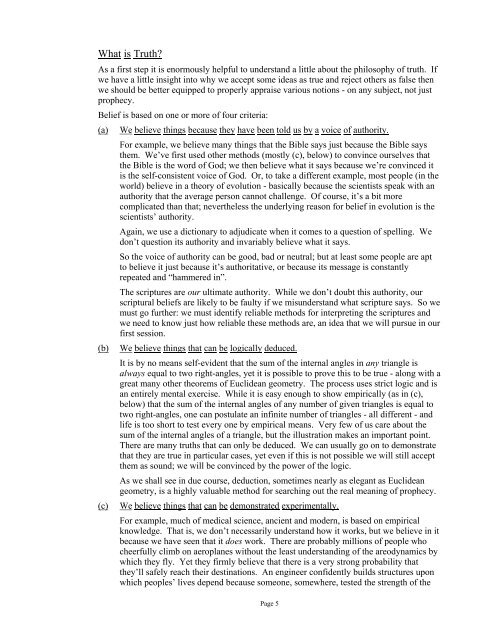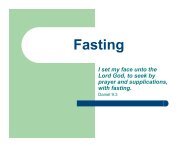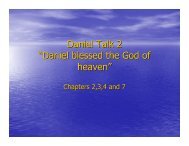Handout - Western Christadelphian Bible School
Handout - Western Christadelphian Bible School
Handout - Western Christadelphian Bible School
You also want an ePaper? Increase the reach of your titles
YUMPU automatically turns print PDFs into web optimized ePapers that Google loves.
What is Truth?<br />
As a first step it is enormously helpful to understand a little about the philosophy of truth. If<br />
we have a little insight into why we accept some ideas as true and reject others as false then<br />
we should be better equipped to properly appraise various notions - on any subject, not just<br />
prophecy.<br />
Belief is based on one or more of four criteria:<br />
(a) We believe things because they have been told us by a voice of authority.<br />
For example, we believe many things that the <strong>Bible</strong> says just because the <strong>Bible</strong> says<br />
them. We’ve first used other methods (mostly (c), below) to convince ourselves that<br />
the <strong>Bible</strong> is the word of God; we then believe what it says because we’re convinced it<br />
is the self-consistent voice of God. Or, to take a different example, most people (in the<br />
world) believe in a theory of evolution - basically because the scientists speak with an<br />
authority that the average person cannot challenge. Of course, it’s a bit more<br />
complicated than that; nevertheless the underlying reason for belief in evolution is the<br />
scientists’ authority.<br />
Again, we use a dictionary to adjudicate when it comes to a question of spelling. We<br />
don’t question its authority and invariably believe what it says.<br />
So the voice of authority can be good, bad or neutral; but at least some people are apt<br />
to believe it just because it’s authoritative, or because its message is constantly<br />
repeated and “hammered in”.<br />
The scriptures are our ultimate authority. While we don’t doubt this authority, our<br />
scriptural beliefs are likely to be faulty if we misunderstand what scripture says. So we<br />
must go further: we must identify reliable methods for interpreting the scriptures and<br />
we need to know just how reliable these methods are, an idea that we will pursue in our<br />
first session.<br />
(b) We believe things that can be logically deduced.<br />
It is by no means self-evident that the sum of the internal angles in any triangle is<br />
always equal to two right-angles, yet it is possible to prove this to be true - along with a<br />
great many other theorems of Euclidean geometry. The process uses strict logic and is<br />
an entirely mental exercise. While it is easy enough to show empirically (as in (c),<br />
below) that the sum of the internal angles of any number of given triangles is equal to<br />
two right-angles, one can postulate an infinite number of triangles - all different - and<br />
life is too short to test every one by empirical means. Very few of us care about the<br />
sum of the internal angles of a triangle, but the illustration makes an important point.<br />
There are many truths that can only be deduced. We can usually go on to demonstrate<br />
that they are true in particular cases, yet even if this is not possible we will still accept<br />
them as sound; we will be convinced by the power of the logic.<br />
As we shall see in due course, deduction, sometimes nearly as elegant as Euclidean<br />
geometry, is a highly valuable method for searching out the real meaning of prophecy.<br />
(c) We believe things that can be demonstrated experimentally.<br />
For example, much of medical science, ancient and modern, is based on empirical<br />
knowledge. That is, we don’t necessarily understand how it works, but we believe in it<br />
because we have seen that it does work. There are probably millions of people who<br />
cheerfully climb on aeroplanes without the least understanding of the areodynamics by<br />
which they fly. Yet they firmly believe that there is a very strong probability that<br />
they’ll safely reach their destinations. An engineer confidently builds structures upon<br />
which peoples’ lives depend because someone, somewhere, tested the strength of the<br />
Page 5







